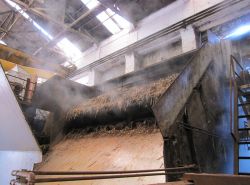 In a recent article, “Indirect Land Use: One Consideration Too Many in Biofuel Regulation,” authors David Zilberman, a professor in UC Berkeley’s Department of Agricultural and Resource Economics and assistant researcher Gal Hochman, along with Deepak Rajagopal, argue that indirect land use effects (ILUEs) should not be considered in current California and federal biofuels polices. The authors write, “…we will argue here against an indirect land use in biofuel regulations for the basic reason that its inclusion in LCAs (life cycle analysis) contradicts a basic principle of regulation – namely that individuals are responsible only for actions that they control. The indirect land uses are difficult to compute and vary over time.”
In a recent article, “Indirect Land Use: One Consideration Too Many in Biofuel Regulation,” authors David Zilberman, a professor in UC Berkeley’s Department of Agricultural and Resource Economics and assistant researcher Gal Hochman, along with Deepak Rajagopal, argue that indirect land use effects (ILUEs) should not be considered in current California and federal biofuels polices. The authors write, “…we will argue here against an indirect land use in biofuel regulations for the basic reason that its inclusion in LCAs (life cycle analysis) contradicts a basic principle of regulation – namely that individuals are responsible only for actions that they control. The indirect land uses are difficult to compute and vary over time.”
In a nutshell, the authors contend that American farmers, or farmers anywhere for that matter, should not, and cannot be held accountable for the decisions made by others in other countries, such as Brazil. “The differences in the treatment of technical and pecuniary externalities is that producers control their production and hence their pollution. But in a competitive market, they don’t control the prices. This reflects a basic principle: Individuals should be responsible for activities that they control and not for those they don’t. This basic message of accountability suggests that producers of biofuel shouldn’t be held responsible for indirect land-use decisions made by others.”
 The authors continue by explaining that there is a related flaw in the use of indirect land use and in how it is applied to regulating biofuels. Basic principles of public economics dictates that all emitters of greenhouse gas emissions are held responsible for their own activities and thus their own emissions. However, ILUE suggests that farmers are responsible for possible emissions by other farmers elsewhere. Therefore, the authors contend, it makes more sense to strive to enact policies that will make countries like Brazil, responsible for their own GHG emissions related to indirect land use.
The authors continue by explaining that there is a related flaw in the use of indirect land use and in how it is applied to regulating biofuels. Basic principles of public economics dictates that all emitters of greenhouse gas emissions are held responsible for their own activities and thus their own emissions. However, ILUE suggests that farmers are responsible for possible emissions by other farmers elsewhere. Therefore, the authors contend, it makes more sense to strive to enact policies that will make countries like Brazil, responsible for their own GHG emissions related to indirect land use.
Ultimately, while the authors acknowledge that there are indirect land use changes inherent in biofuel development, these will be reduced over time as the technologies improve. Yet they caution that the technologies won’t improve, and we won’t move to next generation biofuels if the investment community continues to ignore the industry, in part driven by the flawed theory of indirect land use.

